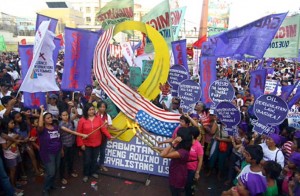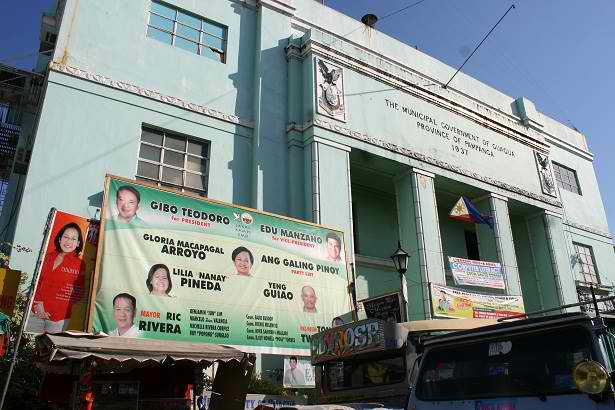Text, photos and video by VINCENT GO
THOUSANDS of Filipino women marched in the streets of Manila on International Women’s Day to protest the Aquino administration’s failure to address social problems besieging the country, with such issues as the increase in prices of basic commodities, labor, health and housing.
Held at Plaza Miranda in Manila on March 8, 2012, the 101st anniversary of International Women’s Day, the protest called attention to the plight of women who are the first to suffer in times of crisis.
According to International Women’s Alliance, working class women are the first to be laid off, and suffer lower wages and difficult working conditions. Unemployment, lack of social security and budgetary cuts for social services put women in dangerous position, the Alliance said.
Women are also forced to leave their families to work as domestic helpers or factory workers in other countries where they face exploitation and abuse, in addition to discrimination. Many poor women are also susceptible to human trafficking or forced into prostitution.
The Ecumenical Institute for Labor Education and Research (EILER), a nongovernment organization in the labor sector, said that based on the Bureau of Labor and Employment Statistics’ 2011 Gender Statistics on Labor and Employment, women bear the brunt of the highly backward domestic economy as they are concentrated on volatile and informal jobs with low or no wages at all.
“There are 2.3 million Filipino women who render unpaid labor especially in the countryside, being classified as part of the ‘unpaid family workers’. This segment of female workforce is mired in rock-bottom poverty and is highly prone to exploitation and abuse,” said EILER executive director Anna Leah Escresa.
EILER said even in the manufacturing sector, women are still at a disadvantage as they earn an average wage that is 7.3 percent lower than men’s wage in the sector. Female factory workers earn on an average P296.36 daily, lower than men’s daily rate of P319.75, though both wage levels are still below the highest mandated minimum wage of P426.
“Wage inequality is sharpest in the hotels and restaurants subsector, wherein women workers earn wages that are 77.80 percent lower than their male counterparts,” Escresa noted.
EILER emphasized that the Philippine Labor and Employment Plan (PLEP) 2011-2016 of the Aquino administration will not address the grim state of Filipino workers as the policy merely hinges on employment facilitation rather than creation of new and decent jobs.
Gabriela Women’s Party led the protest, and emphasized the problem of high oil prices. “Amid the specter of our women reeling from the headache of trying to make ends meet, we have a president who refuses to heed the call of the Filipino people to scrap the Oil Deregulation Law, EVAT, EPIRA (Electric Power Industry Reform Act of 2001), and all laws that impose a heavy toll on our women’s pockets, hearts, minds, and stomachs,” said Gabriela Rep. Emmi de Jesus.
De Jesus said Aquino has “totally abandoned the protection and respect for the rights and welfare of poor Filipino women and their families by consigning one of its most important resources to big foreign companies,” referring to the 15 oil and gas exploration contracts offered for bidding to big transnational companies, in the midst of the increasing prices of oil products due to monopoly overpricing and speculation in the oil futures market.
“The big oil firms are raking billions of pesos in profits, while consumers are made to bear the burden of higher fuel cost every week. With the Aquino Government adhering to the oil deregulation policy, the Filipinos are left defenseless and at the mercy of the profit-hungry oil cartel, citing Petron’s registered net profit of P8.5 billion for 2011,” said Eleanor De Guzman of BAYAN. “It is the government’s duty and responsibility to protect the public from predatory pricing. it should stop justifying local high prices and pointing to world market prices as the excuse.”
Gabriela Rep. Luz Ilagan said the impoverished condition of the Filipino people is all the more worsened with the lack of social services given to Filipino women and mothers with the failure to immediately pass the Reproductive Health bill.
“The RH bill is long overdue. Women are spending less and less of their family budget for healthcare. It would certainly help if the Aquino government would help ensure that maternal health services are provided free of charge in village centers and public hospitals, instead of making a turn toward privatization that will inevitably make health more of a business than a social service,” Ilagan said.
While the protest was going on at Plaza Miranda, among those watching was Nanay Leony, an elderly woman selling vegetables. Asked if she knew what was going on and the significance of that day, she said she had no idea what it was all
about.
Nanay Leony said all she knows is that because of all the people protesting in the area, she would not be able to sell her vegetables and pay the P70 per day bribe money that unscrupulous policemen collect from her so she could sell her vegetables in the sidewalks of Plaza Miranda.

